Zoho CRM review
In our Zoho CRM (customer relationship management) review, we look at one of the best CRM software packages available today, including contact management, email marketing, and sales automation features that can help you win new business.
5 reasons why a small business needs a CRM
Zoho CRM review: Snapshot
Zoho CRM has been ranking high on sales management software lists and, recently, it’s doubled down on developing customization and automation options while making its design more user-friendly. That’s very good news, as its extensive set of features can get overwhelming if you’re new to the product.
The product offers contact and deal management, email marketing, call logging, meeting management, and task reminders, with additional AI-backed pipeline recommendations and predictions for higher-tier plans. For a productivity boost, you can use customization tools to design your analytics dashboard, for example, and create automation rules such as sending emails after customer calls.
Zoho CRM is more feature rich and cost effective than solutions such as Insightly and Freshworks CRM, but it’s in tight competition with advanced sales and marketing suites like HubSpot CRM and Salesforce (US-only link). It could be the best choice for you if you require advanced automation, customization, and email marketing functionality.
Score: 4.5/5
Read on for our full and detailed review.
Today's best Zoho CRM deal

Get Zoho CRM from $14 / £12 per user/month
Zoho's CRM plans cover a great mix of features, from the basic to more sophisticated, making it a great choice for small, medium, and even larger businesses that want to accelerate productivity in their sales pipeline.
Zoho CRM's competitors
| Zoho CRM | Insightly | Salesforce | |
|---|---|---|---|
| Score | 4.5/5 | 4/5 | 5/5 |
| Pros | Workflow automation, customization, email marketing | Project management tools, workflow automation, advanced reporting | Advanced customization, advanced reporting, intuitive layout |
| Cons | Steep learning curve, limited customer support | Limited lead generation, limited customization | Expensive for smaller businesses, may require technical skills |
| Verdict | Customizable sales and marketing suite with a focus on automation, but requires some practice to use with ease. | Geared towards productivity and project tracking, this solution is most suitable for end-to-end customer management. | Powerful, streamlined sales enablement features, but the higher cost makes it more suitable for larger businesses. |
| View deals | Visit site | Visit site | Visit site (US-only link) |
Zoho CRM: Key features
Zoho’s core CRM, comprising contact and deal management, captures data about prospective leads, from contact details to deal status and communications. Though the default list view, including multiple filters, feels a bit clunky, Zoho CRM also includes a Kanban view segmented by pipeline stages, and a customizable Canvas view.
Through automation, you can remove manual work by creating rules, such as assigning sales reps based on account characteristics, and setting tasks triggered by pipeline changes. Automation setup comes with a learning curve, but the streamlined process can help generate more business.
Zoho CRM’s paid plans include email templates, mass email campaigns, and tracking performance metrics such as open rates. For more advanced marketing functionality, you can integrate with Zoho Campaigns, a separate product in the Zoho suite. Generating new leads is also a key strength—Zoho CRM enables you to gather data from web forms and scrape social media sites.
Zoho CRM makes dashboards and reports highly customizable, which can support pipeline decision-making. For example, you can select chart types and metrics to visualize a customer segment, or export a list of deals based on chosen filters.
For Enterprise plans and above, Zoho’s advanced analytics such as anomaly detection can help identify high-value customers, and the Zia Artificial Intelligence assistant can forecast revenues and suggest tasks to automate.
Zoho CRM: Key features and highlights
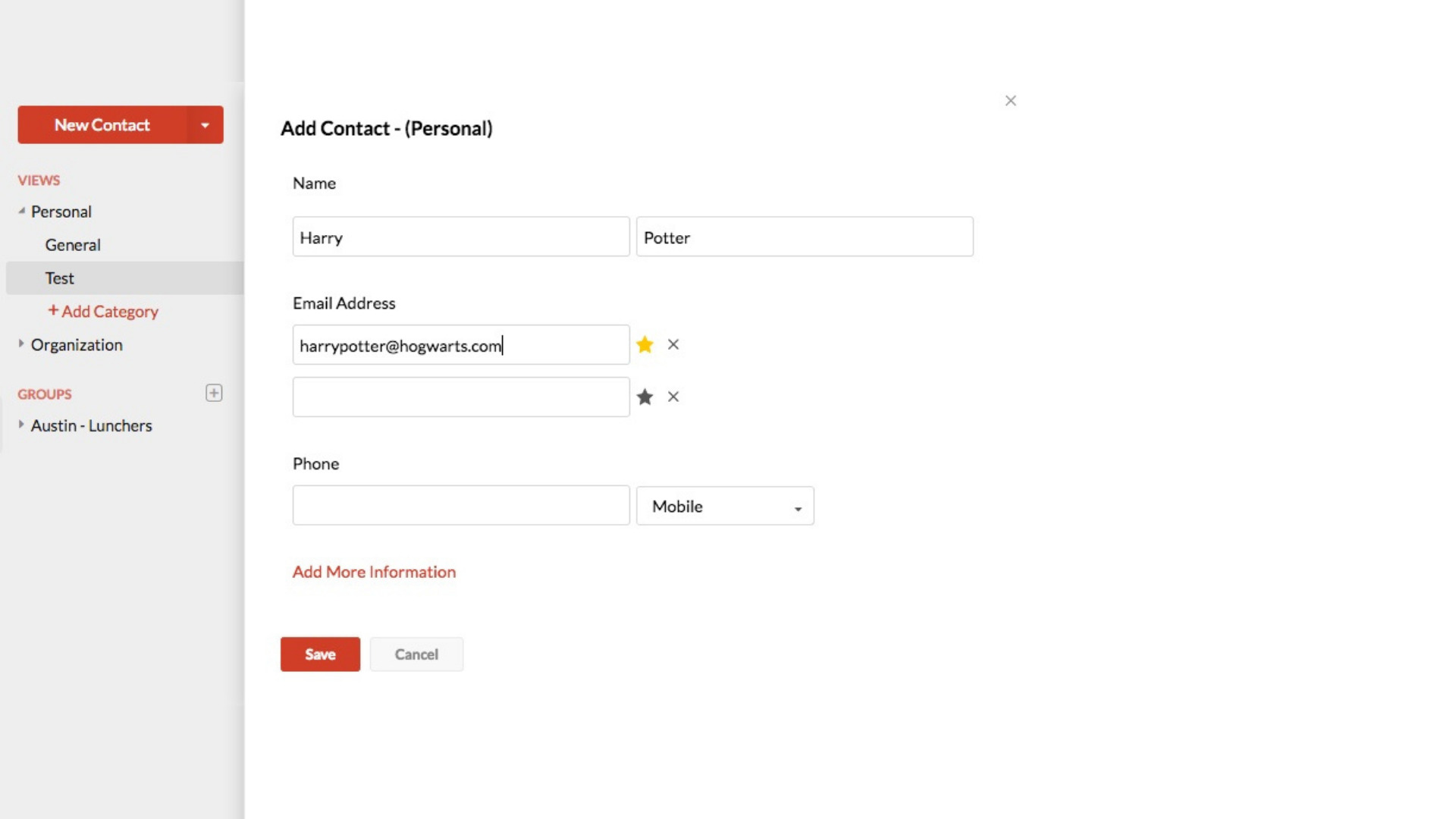
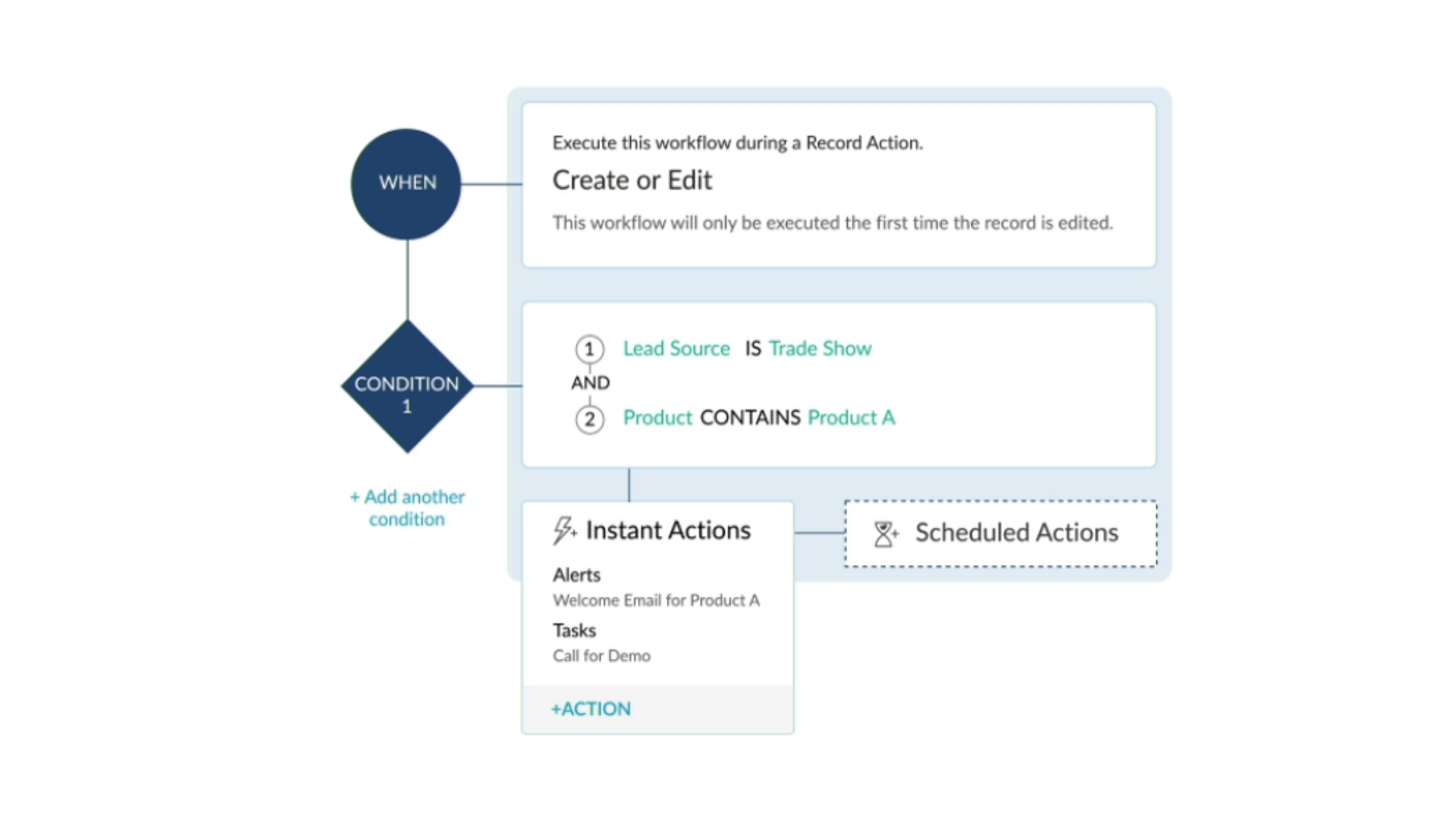
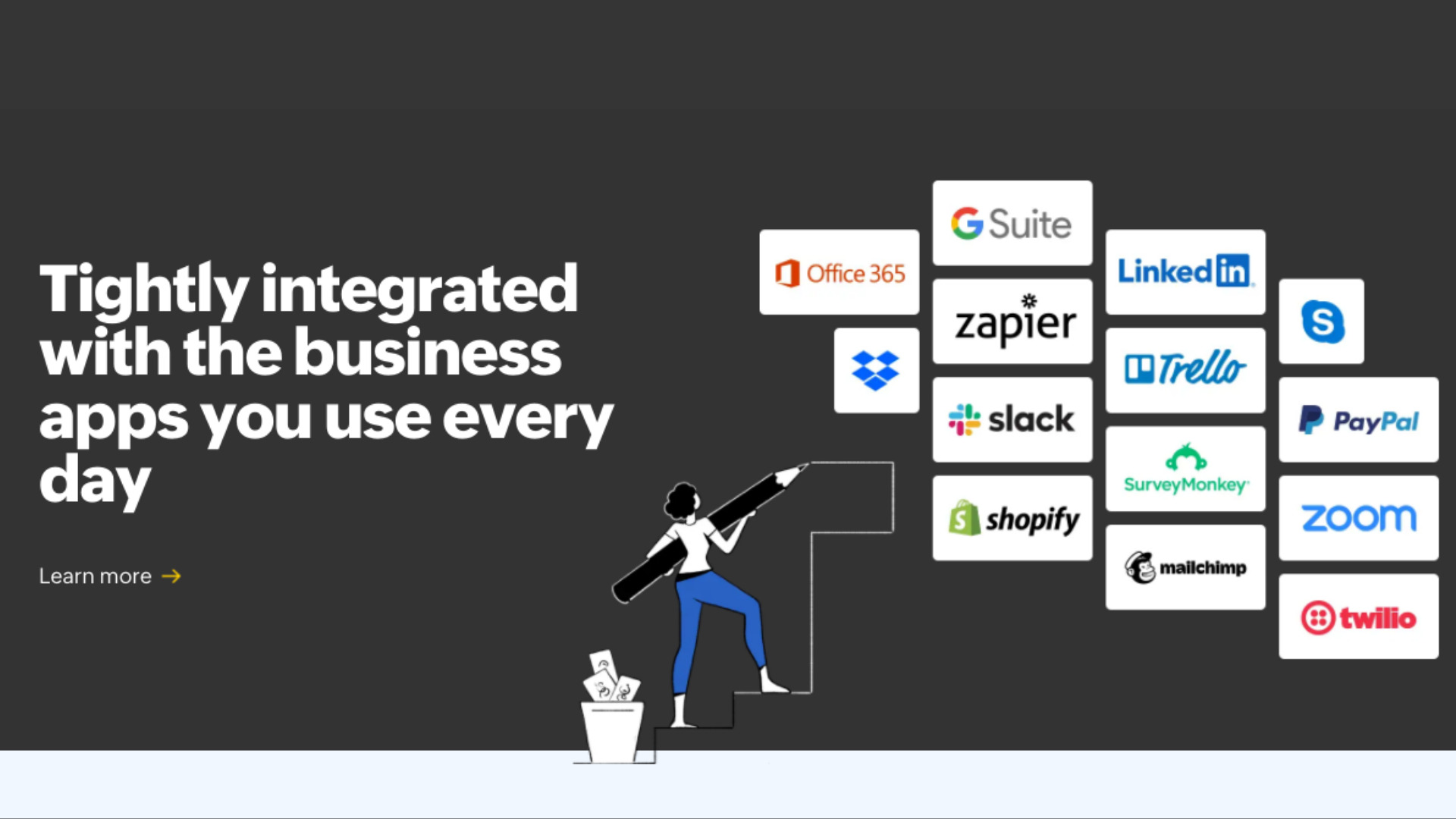
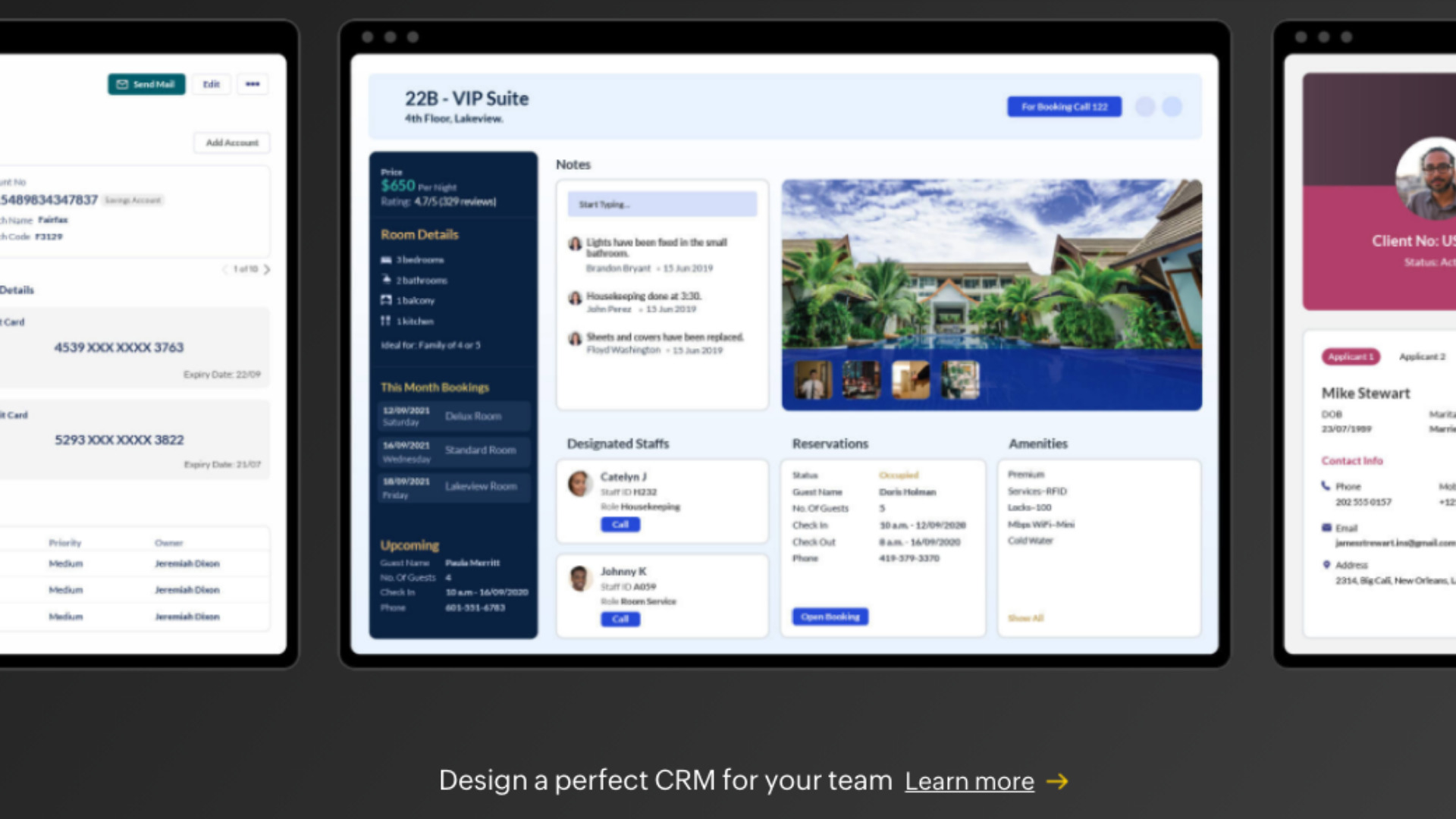
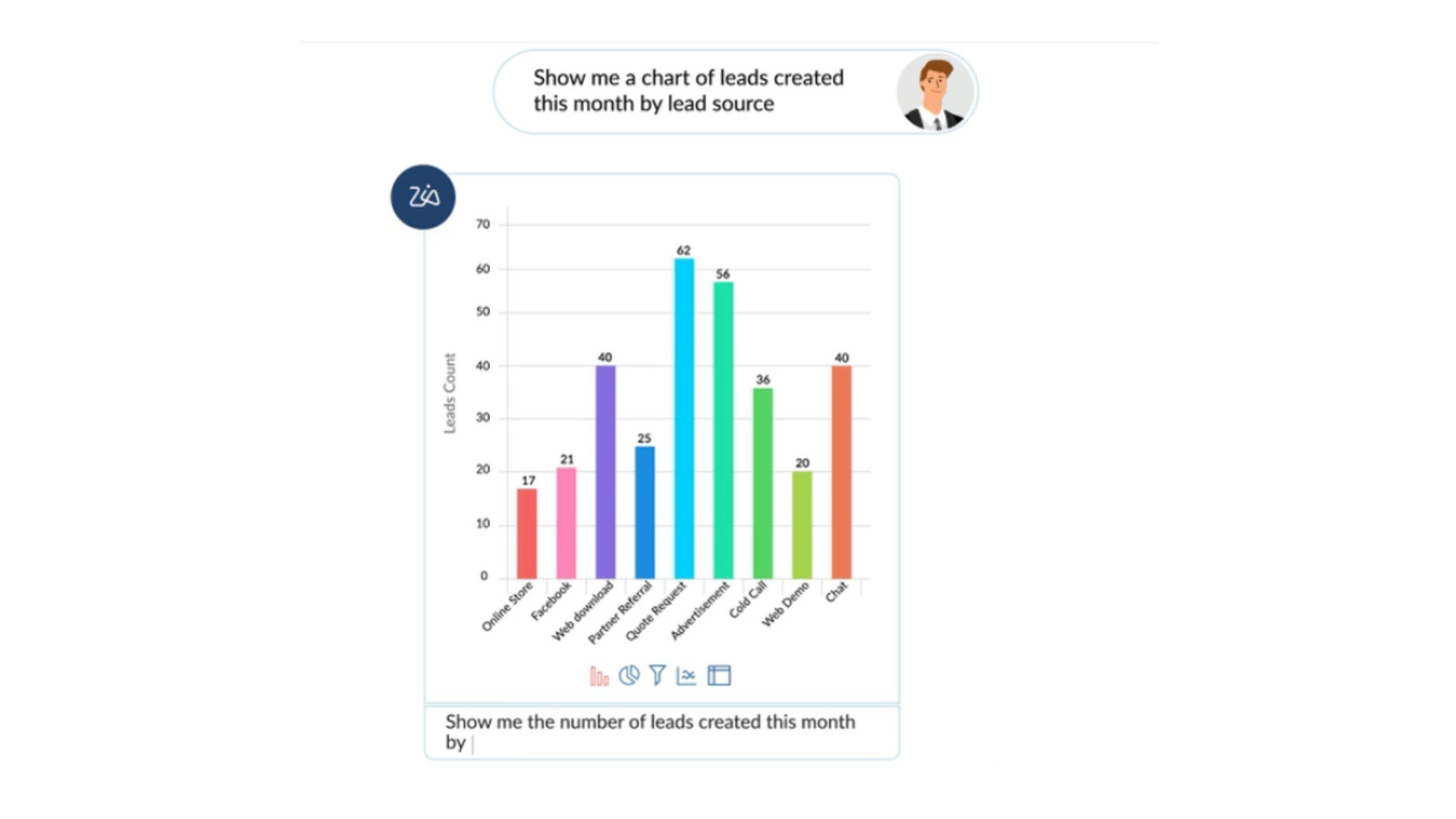
Zoho CRM: What’s new?
Over the past year, Zoho CRM has seen improvements primarily across its workflow automation, email, and social media integrations, as well as the Zia Intelligent Assistant functionalities. Based on prospect interactions with calls and emails, you can now automate tasks or follow-ups. Social media account updates can also trigger actions, including sending email campaigns.
Workflows have been more closely integrated with Zia. For example, you can decide to automatically follow Zia recommendations without any manual oversight. Zia’s data enrichment function has also been upgraded: it can, for example, pull contact data from email signatures and save it to the CRM.
There’s been an update to the look and feel of the software, too. User interface elements, such as buttons, have a more modern feel, and Kanban board elements have been rearranged for more clarity and ease of use.
Overall, Zoho CRM is good at releasing marginal improvements across usability and functionality; however, its overwhelming list of features needs clearer categorization.
Zoho CRM: Pricing
Zoho CRM has five main pricing plans, with one additional CRM Plus plan for larger enterprises. The free plan, for up to three users, has the core CRM with contact and deal management, but with limited automation, customization, and support options.
Paid plans are $14 to $52 per user a month, billed annually. Zoho CRM Plus, featuring a more comprehensive set of sales, marketing, and helpdesk tools, starts at $57 per user a month (billed annually). Subscriptions can also be billed monthly at a slightly higher cost (starting from $20 a month on the Standard plan, and increasing up to $65 a month on Ultimate).
| Plan type/feature | Free | Standard | Professional | Enterprise | Ultimate |
|---|---|---|---|---|---|
| Cost per month (billed monthly) | Free for 3 users | $20 | $35 | $50 | $65 |
| Cost per year (billed annually) | Free for 3 users | $168 | $276 | $600 | $780 |
| Contact/lead management | ✓ | ✓ | ✓ | ✓ | ✓ |
| Basic workflow automation | ✓ | ✓ | ✓ | ✓ | ✓ |
| Email marketing | X | ✓ | ✓ | ✓ | ✓ |
| Zia Artificial Intelligence | X | X | X | ✓ | ✓ |
Testing Zoho CRM
We’ve analyzed Zoho CRM’s key differentiating features from the perspective of a sales team, testing the efficiency of key activities such as adding new contacts. Below, we look at customization, automation, and general usability, as these features affect sales teams’ productivity in closing deals.
How customizable is Zoho CRM?
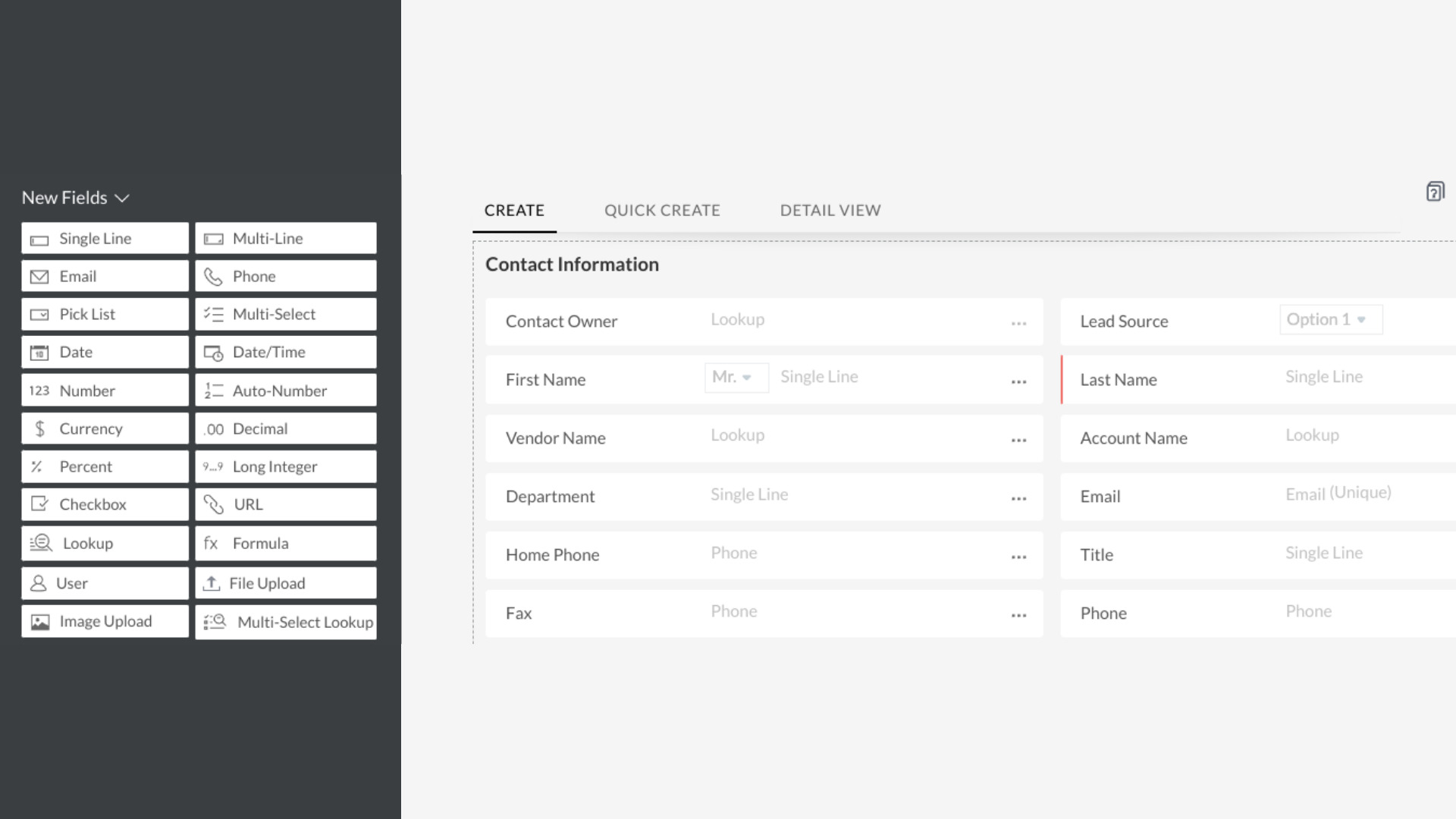
You can customize almost every aspect of Zoho CRM, though there can be limits depending on your plan. For example, Canvas, which is a customization tool that re-styles page interface, deal boards, and more, includes only one design for Standard plans, three for Professional, and five for Enterprise.
Zoho CRM’s features, also called modules, contain a variety of filters and visualizations that can help you control what you see. In the contact and deal modules, data can be filtered by deal stage, country, and other variables, and you can even go so far as formatting the text in which results are displayed. The default list view for data-heavy modules can feel excessive, so it’s worth designing a simplified user interface.
A variety of external integrations, including with other Zoho products, also contributes to a personalized experience. Adding tools such as Zoom and Mailchimp is only three clicks away via the Marketplace module, and can enrich your customer data and communication. Integrations are limited on the free plan, however.
On the downside, the various Zoho CRM branded customization tools, such as Wizards and Canvas, can get confusing, and the differences between them aren’t always clear.
Is Zoho CRM automation effective?
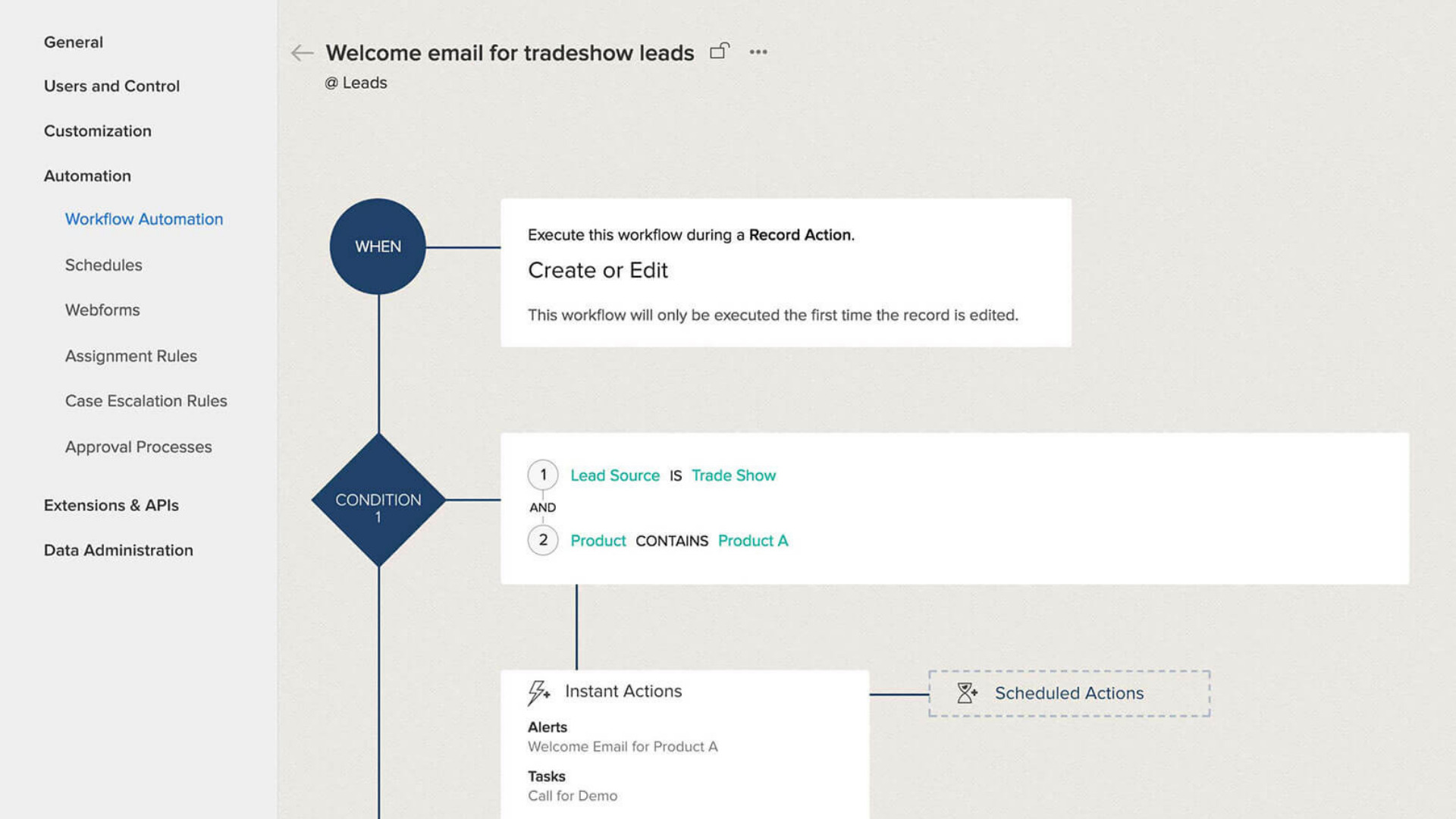
Automation tools in Zoho CRM can be very powerful, but the learning curve can be jarring at first. When you set up an automated task, for example, you’re taken to a process flow view where you must select the time of the trigger, the person responsible, and other conditions.
This can be tedious and time-consuming to start with, but the level of detail may be valuable to bigger organizations with complex pipelines. Other automations are simpler. Say, for example, you want to set up a lead scoring rule such as, “add 10 points if the account’s yearly revenue is over $100,000”. This takes around three clicks, and can help you prioritize high-value opportunities.
Though the automation section is one of the platform’s most competitive features, it can also be tricky to find it among Zoho CRM’s many modules and settings.
Is Zoho CRM easy to use?
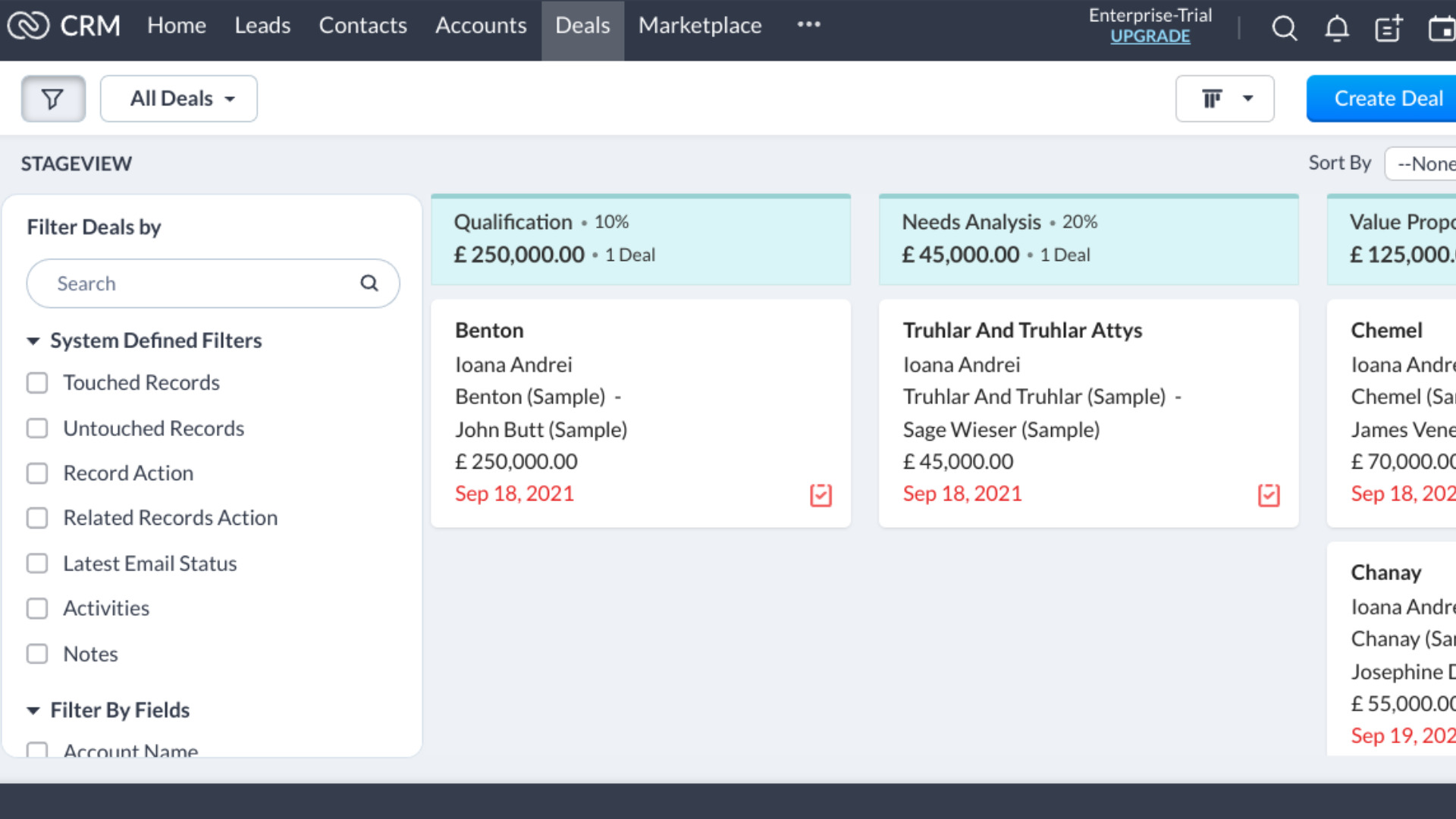
The product is easy to use once you find the function you’re looking for; however, those new to the software have to learn where tools sit through trial and error.
For instance, creating a new record for a lead or a deal is one click away on the home screen and module pages. Though there are many data fields you can fill in the record, only a handful are mandatory, so you can save it in a matter of seconds. If you customize the page layout to only contain your most relevant customer fields, you can further streamline the process.
Mass emailing, though a key differentiator for Zoho CRM, is not straightforward to use. It doesn’t sit under the expected "Campaigns" module, but as an action under "Contacts", "Leads", and "Deals". However, once you find it, the mass email function is easy to set up and send to specified segments.
Finally, the web-based Zoho CRM loaded pages relatively quickly, considering the amount of data it works with. A TTFB (Time to First Byte) of around 400 ms was recorded (our test was performed with Google Page Speed, on a Windows 10 PC with an Intel Core i5, 8GB RAM, and 68Mbps internet speed).
Alternatives to Zoho CRM
Zoho CRM has strong competition, particularly at its lower price levels. For instance, its free plan, while covering customizable contact and deal management, doesn’t include email marketing and has limited third-party integrations.
Competitors such as Insightly and Agile CRM include mass email campaigns on their free plans; the free Hubspot CRM additionally analyzes email campaign performance, which Zoho CRM can’t do without integrating with Zoho Campaigns. Read our review of Insightly to find out more.
On paid plans, Zoho CRM’s feature set is quite competitive, but has some gaps. For instance, if you want to keep track of projects after closing deals, Zoho CRM features are limited to invoicing and purchase orders—whereas a software like Insightly has broader project management functionality, including project task management, timelines, and a meeting tracker.
Salesforce (US-only link) is Zoho CRM’s competitor for enterprise-grade businesses, offering similar features with more advanced customization and reporting. Salesforce is particularly useful for large organizations that develop custom sales applications—for example, using sandbox environments—but this comes at a significant price compared to Zoho CRM. Read our Salesforce review to learn more.
| Zoho CRM | Insightly | Salesforce | |
|---|---|---|---|
| Email marketing | Yes | Yes | No |
| Advanced customization | Yes | No | Yes |
| Support | Email support, Mon–Fri; 24/7 multi-channel support costs extra | Email support only; premium phone and training support costs extra | Email ticketing and toll-free phone |
| Basic plan | $14 per user a month (billed annually) | $29 per user a month (billed annually) | $25 per user a month (billed annually) |
Zoho CRM: Final verdict
Zoho CRM is well worth your attention if you’re looking for a comprehensive set of sales and marketing features, with enhanced productivity via automation and customization options.
Leads and deals are easy to organize and edit using the drag-and-drop Kanban or self-designed Canvas view. Advanced automation and workflow rules can be set to categorize leads, assign tasks, and more, but it may take some time to do this with ease.
Generally, Zoho CRM’s customization options come with both productivity value and a difficult setup. However, the vast tutorial library and email support will help guide you through.
Zoho CRM’s inbuilt email marketing and client management tools, including invoicing, are competitive additions to the core CRM, distinguishing Zoho CRM from competitors who focus on niche aspects of sales management. Moreover, integrations with other Zoho products and third-party solutions expand what you can do with this software.
Overall, Zoho CRM’s plans cover a great mix of features, from basic to more sophisticated, making it relevant for small, medium, and even larger businesses that want to accelerate productivity in their sales pipeline.
Further reading on CRM software
To learn more about CRM, have a look at our feature What is a CRM?
If you’re in the market for CRM software, check out our best CRM software buying guide, or, if you’re on a budget, our best free CRM software top picks.
We’ve also rated the best CRM for real estate, and you may want to read the accompanying feature what is a CRM in real estate?
0 comments:
Post a Comment